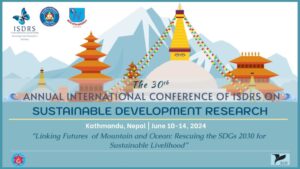Goals And Objectives Of The Track
Sustainable Technology and Digital Transformation play a significant role in contributing to the United Nations Sustainable Development Goals (SDGs) by leveraging digital tools and platforms, addressing the social and environmental impacts of digital technologies, and promoting their responsible and ethical use for sustainable outcomes. Digitalization is expected to be an essential precondition for six major transformations needed to reach the sustainable development goal targets by 2030, including improved human capital, responsible consumption and production, a decarbonized energy system, healthy, affordable food and clean water, sustainable cities and communities, and a digital government. However, it’s important to note that digital technology is responsible for a significant share of global greenhouse gas emissions, and its environmental impact should be carefully considered.
The SDG Digital Acceleration Agenda, developed by ITU and UNDP, provides a roadmap to governments on their digital transformation, showcasing concrete examples of how data and digital technologies can be used to bring the SDGs back on track. In summary, sustainable technology and digital transformation are instrumental in achieving the SDGs by leveraging digital tools and platforms, addressing the social and environmental impacts of digital technologies, and promoting their responsible and ethical use for sustainable outcomes.
Contributions related to the following areas and fields are welcome:
- Advancing sustainable technologies and digital solutions for sustainable development.
- Integrating digital tools and platforms for monitoring and managing sustainability initiatives.
- Addressing the social and environmental impacts of digital technologies.
- Promoting responsible and ethical use of technology for sustainable outcomes.
Length And Content Of The Proposed Abstract To The Track
Each proposed abstract (in connection to one of the areas pointed out above) within 300 and 500 words (including everything)
- shall be best organized (without headlines) along usual structures (e.g. intro/method/findings or results/ discussion/conclusions)
- does not need to, but can include references
- shall provide in a final section
a. to which SDG(s) and SDG-target(s) their proposed abstract especially relate to (e.g. “SDG+Target: 14.1.”).
b. a brief indication how the proposed contribution relates to the topic of the Conference (Linking Futures of Mountain and Ocean: Rescuing the SDGs 2030 for Sustainable Livelihood)
Abstracts which do not outline points 3.a.) AND 3.b.) might be considered less relevant in the Review.
Potential Publication Channels
With regard to potential publications, depending on the number and quality of contributions, diverse publication opportunities will be envisaged.
Submission
Keep up to date with developments of ISDRS 2024 Tracks here
“Linking Futures of Mountain and Ocean: Rescuing the SDGs 2030 for Sustainable Livelihood“
Who are we?
Bhojraj Ghimire, School of Technology, Nepal Open University, Nepal.
bghimire@nou.edu.np
Sojen Pradhan, University of Technology Sydney, Australia.
sojen.pradhan@uts.edu.au
Rabiah Abdul Kadir, Institute of IR4.0, Universiti Kebangsaan Malaysia, Malaysia.
rabiahivi@ukm.edu.my
Mei Choo Ang, Institute of IR4.0, Universiti Kebangsaan Malaysia, Malaysia.
amc@ukm.edu.my
